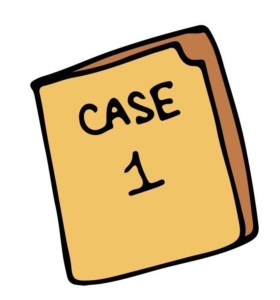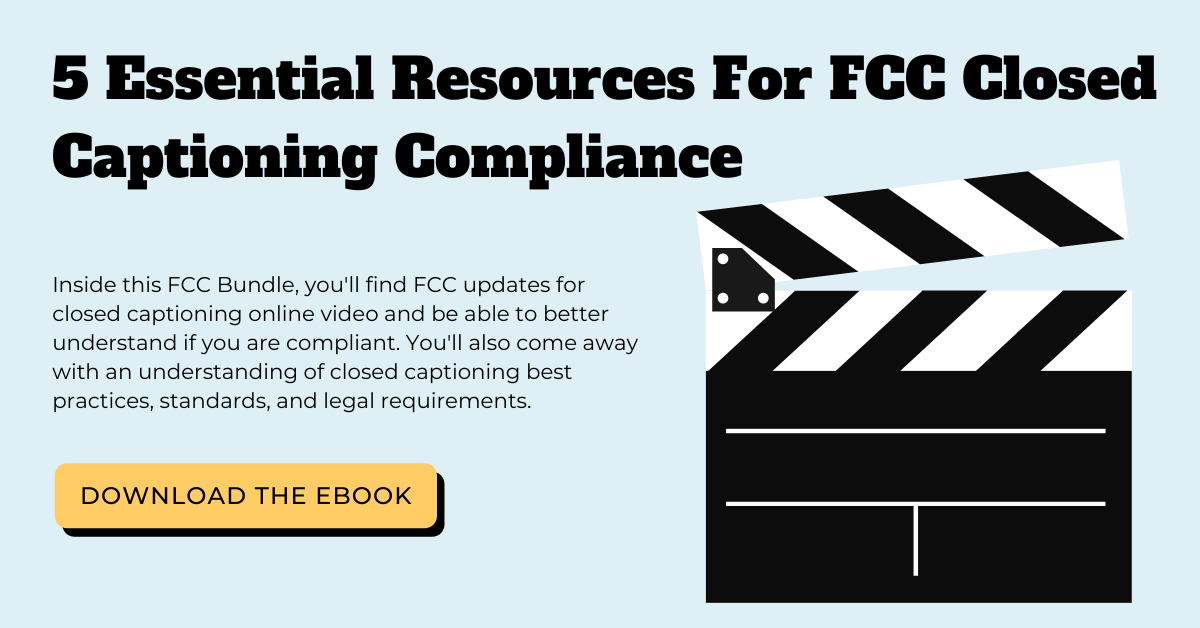Captioning Laws for TV and Movies
Updated: February 23, 2021
Closed captioning laws for TV and movies were established in order to make media accessible to viewers with hearing loss.
For the entertainment industry specifically, laws and standards like the ADA, the CVAA, and the FCC serve as a guideline for achieving accessibility. Depending on the platform used, different laws may apply to certain TV programs and films. That’s because certain laws pertain to streaming media vs. broadcasting media.
Captions are time-synchronized text that narrate the important auditory information in a program. It’s a critical accommodation for the 466 million people globally who are deaf or hard of hearing, and it’s required by law.
Let’s discuss the major accessibility laws and lawsuits around captioning TV and movies so that your media is legally compliant, and most importantly, accessible to all viewers.
Essential Resources for FCC Closed Captioning Compliance
The CVAA
The 21st Century Communications and Video Accessibility Act (CVAA) is a major accessibility law in the United States. Former President Barack Obama signed the law in October 2010 to increase the access of modern communications for people with disabilities.
The CVAA applies to programs that previously aired on television and are now online. Under the law, closed captions must be provided for all programming and it must comply with FCC caption quality requirements. This is directly mentioned in Title II of the CVAA.
Any programming that has only been shown on the internet does not need to be captioned under the CVAA. However, that’s where the ADA comes in, which we’ll discuss in a later section.
The FCC
The FCC, or the Federal Communications Commission, has regulated interstate and international communications since the 1980s. According to the FCC, TV programs and movies must be captioned.
In addition, the FCC provides quality standards for captioning across platforms. Although the FCC ruling applies solely to broadcasters, the FCC does state that quality standards for television closed captioning are of increasing importance because they dictate the standard for online video as well. Therefore, the FCC’s quality standards not only impacts media broadcasters but streaming services as well.
The FCC’s four aspects of captioning quality are accuracy, synchronicity, program completeness, and placement.
- Caption accuracy: captions must include all words spoken in the order spoken – basically, no paraphrasing. Captions must also use proper spelling, spacing, capitalization, and punctuation.
- Caption synchronicity: captions must coincide with their corresponding spoken words and sounds to the greatest extent possible
- Program completeness: captions must run from the beginning to the end of the program, to the fullest extent possible
- Caption placement: captions shouldn’t block other important visual content on the screen (i.e. character faces, featured text, etc.)
The FCC not only has standards for pre-recorded content but live programming as well. Although they provide some stringent guidelines for closed captioning, they do allow for some leniency for live captions. There can be a slight delay in the delivery of live captions, however, the delay in the presentation of live captions should be kept to a minimum, should be consistent with what’s being said, and enables viewers to follow along with the program.
Learn how to be FCC Compliant ➡️
The ADA
The Americans with Disabilities Act (ADA) was enacted in 1990. It’s a broad anti-discrimination act that protects individuals with disabilities from discrimination.
Title III of the ADA oversees places of public accommodation. These places include businesses like movie theaters, hotels, museums, restaurants, etc. Under Title III, no individual can be discriminated against on the basis of disability with regards to full and equal enjoyment of the goods and services at any place of public accommodation.
When the law was passed, it was well before the internet was as widespread as it is today, therefore, it was always implied that the ADA solely applied to physical places, like brick and mortar businesses.
The ADA doesn’t specify physical vs. digital places, so the law is open to interpretation. However, a string of lawsuits brought against companies for inaccessible communications has created a strong precedent that the ADA applies to the internet as well.
Media and Entertainment Lawsuits
There have been a number of lawsuits filed against broadcasters and streaming service companies for failing to caption TV programs and movies, like Netflix and CNN.
In 2010, Netflix was sued by the National Association of the Deaf (NAD), alleging that the streaming giant was discriminating against deaf and hard of hearing viewers because not all of their programs were captioned.
Despite not having a physical location, the NAD asserted that Netflix was a place of public accommodation, even if the business operates online.
NAD v. Netflix was significant because it was the first time the ADA had been interpreted for an online-only business.
Instead of taking the case to court, Netflix decided to settle and agreed to caption 100% of their videos indefinitely.
Following the settlement, Assistant Attorney General Thomas E. Perez had this to say about the shift in media consumption:
The other entertainment company sued for failing to caption their content was Time Warner Inc. and CNN. The advocacy group GLAD, otherwise known as the Greater Los Angeles Agency on Deafness, filed a lawsuit against Time Warner Inc., the parent company of CNN.com. In the suit, the plaintiffs claimed that the videos on CNN.com weren’t captioned and stated that the website discriminated against viewers with hearing loss.
According to Reuters, many of the videos were accompanied by text, but they seldom matched the audio of the video and the text wasn’t a substitute for captioning.
These suits, and multiple others, go to show that captioning is essential for both broadcast and streaming media. Without closed captions, media companies could risk a potential lawsuit. Therefore, it’s best to comply with the major laws. The captioning laws for TV and movies ensure that all viewers, regardless of ability, can always enjoy video content.










